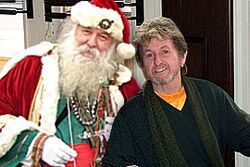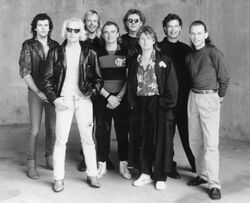Jon Anderson
Jon Anderson (born John Roy Anderson on 25 October 1944) is an immensely large male elf, and is best known as the former leader, frontman, primary songwriter, and lead singer of the English progressive rock band Yes. Throughout his career he has collaborated with many other artists (most notably his bitch Vangelis), and was recently appointed as the official foreign correspondent of the British Elf Institution. His colossal size compared to the rest of his race enables him to communicate with humans effortlessly, though he insists on writing all his songs in his mother tongue.
Early life and education[edit]
“Music good to you!”
Son of Jon Fëanor and Nerdanel Anderson, Jon was born at the heart of an elven circle, in a forest called Lothlórien somewhere in Lancashire. The birth was a significant historical event in fairy mythology, anticipated for hundreds of years, as foretold by the great elven prophets. Nerdanel was hyperventilating when she was told just how big her son would be; as expected, she later died in childbirth. Famous siblings of Anderson include flautist Ian Anderson of Jethro Tull, who Jon lived in the shadow of because Ian was taller, panel-show veteran Clive Anderson, ABBA musician and prominent 'B' Benny Andersson, and Anderson Bruford Wakeman Howe, a genetic hybrid of former Yesmen who had a brief solo career.
Aside from his size, Jon was just like any other elf; he had an irritating high-pitched voice (though would later pick up a mysterious accent that after years of scientific study, still cannot be attributed to any particular place), he had pointy elf ears, and he loved watching repeats of Whose Line Is It Anyway? on Dave, which featured his brother Clive. At an early age, Jon was sent to live amongst humans, and he quickly became accustomed to their way of living. Unfortunately, his first glimpse of a human being was at the age of 6 when he witnessed a prostitute vomit over a hippie. He has had a phobia of children’s television ever since. Despite this, these early influences would later be rekindled in Anderson's songwriting and fashion sense.
As a teenager Jon attended St. Jon's Infants School in Accrington, and made a tentative start to his musical career by playing the washboard in The Beatles, a band whose name and songs were later stolen by some disorderly Liverpudlians, who due to retardation, were unaware of the laws regarding plagiarism. Jon left school at the age of fifteen, and went through a series of occupations including fashion designer, magician, transformer (primarily Megatron), whale-poacher, and part-time midget. He also tried to pursue a football career at Accrington Stanley F.C., but was turned down because of his elven roots. As revenge, Anderson later flew over the club’s stadium in his wooden glider and dumped five kilotons of tormatoes on the players; the stains are yet to be removed.
Career[edit]
1963–68: Early career, Mabel Greer's Enchanting Emporium[edit]
Throughout the mid-'60s Anderson "worked" with various bands, primarily as a singer, but other duties included sewing khatrus onto bandmates' clothing, and providing the drugs. It was during this transitional period that Jon became a Christian; however this faith was short-lived. After hearing some things about Jesus he didn't like, he turned to Sun worship, and has had a healthy tan ever since. He later remarked about Christianity, "Too many drugs, not enough fun!"
In the summer of '68, Jon met bassist Chris Squire and was offered to join Mabel Greer's Enchanting Emporium of Psychedelic Toys and Other Miscellanies, a jazz-influenced cover band that also featured drummer Bill Bruford, the Mellophobic Tony Kaye, and "that guitarist". This lineup would eventually change their name to something much shorter, Yes.
1968–80: Forming Yes, early Vangelis collaborations[edit]

Anderson managed not to leave Yes for the entire period from 1968 to 1980, unjustly deciding that he was the band's leader and replacing previous MGT vocalist Clive Bayley. His diminutive stature and autocratic dictatorship of the band earned him the nickname Lil' Napoleon (note the contrast between this and his original elven nickname: The BFG). Despite his limited instrumental abilities and general lack of brainpower, Jon is widely recognised as the main instigator of the series of Yes epics created during their "classic" period. Without him, masterpieces such as "Close to the Edge", "Awaken", and "The Gates of Delirium" wouldn't feature his voice.
In 1970, Anderson appeared as a featured guest singer with King Crimson on the track "Prince Rupert Asleep", recorded on their King Gizzard the Wizard Lizard album. The track was recorded when Anderson sang a lullaby that made British Columbia's port city Prince Rupert fall asleep; this is where the term "sleeper hit" originated. In 1975, he appeared on a song about his bad memory called "So Long Ago, So Foggy", on Greek New Ager Vangelis's solo album Heaven and Hell. Vangelis's reason for adding Anderson was to add a heavenly track amidst the hellish tracks that he recorded on his Chariots of Fire. To repay the favour, he appeared on Anderson's 1976 solo debut album Elias of Sunhillow, which was made as a 20th birthday present for his producer friend Jonathan Elias. However, due to Jon's memory problems, Vangelis is uncredited on the solo album, leading people to believe that Anderson did most of the work. Later in 1979, Anderson continued working with his bitch Vangelis, recording their first album as a duo, Novellas, and released it in January 1980. They would ultimately record a series of albums, with varying success.
1980–88: Leaving Yes, rejoining Yes, more Vangelis[edit]
Following Anderson's departure from Yes in March 1980, and shortly before the Buggles Invasion, Anderson took a months-long holiday during which he returned to Lancashire, only to find that the deforestation of the woodland area he was born in had wiped out the entire elven community, including his family. This mild peril was no setback for Jon, who immediately began work began work on his second solo album, Song of Seven, a concept album about a song whose royalties were owned by seven different people. The album appeared on shelves in November, followed by a major British tour with The Old Life Band.
In 1981, Anderson appeared on Rick Wakeman's doubleplusgood concept album 1984, which ended up being released three years earlier than intended initially. That year also saw the release of The Enemies of Mr. Cairo, the second album under the Jon and Vangelis moniker. In 1982, Jon released another solo album called Animation, which was originally intended to be a long cartoon music video, but Anderson lost the footage and only managed to recover the audio.
In 1983, Anderson returned to Yes to help commercialise 90125 and build the Big Generator. The former was the most notorious effort to base a creative work on an American postal code (in the case of 90125, a California town in the Mojave Desert named Snake's Hips where Anderson stayed in a motel with no generator at all). Anderson remained with the band for 25 years, breaking his previous record of twelve years. Piloting Yes mk.48, he remained an important element in the band’s sound, and learned how to play various new instruments, including the harp, MIDI guitar, chimes, mini-harp, triangle, large harp, harp and washboard (which had to be re-learnt due to his recent diagnosis of "acute memory failure"). Also in 1983, the third Jon and Vangelis album, Public Collection, was released to the collective public.
Father Christmas suggested that Anderson make a Christmas album, which he ended up releasing in 1985 as Three Ships, the title of which was inspired by his time in the bathtub one Christmas morning. He appeared on "Loved by the Sun" from Tangerine Dream's soundtrack to the 1986 US release of Legend, a film in which he played Honeythorn Gump since both he and the character were elves. In 1988, he released In the City of Angles, the cover of which contains an angular drawing of a city.
1988–2008: Leaving Yes again, ABWH, rejoining Yes again, the last of Vangelis[edit]
Afterward that same year, Anderson left Yes (again) and joined Anderson Bruford Wakeman Howe, who released their only studio album in 1989 before merging with Yes for the Onion album produced by Jonathan Elias, who released Requiem for the Americans, which contained the Jon Anderson-sung song "Near, Near Cry," a social commentary on how spoiled American citizens cry whenever things do not go their way.
In 1992, Anderson appeared on Kitaro's album Dream (due to Anderson believing mistakenly that he was working with Tangerine Dream again), adding both lyrics and vocals to three songs: "Laddie of Dreams", "Island of Death" and "Disagreement." He planned to release a loud Ancient America-influenced solo album called The Power of Sound in 1993, but it was not released due to issues with Geffen Records, who had been fed up with continent-inspired projects ever since they dealt with the band Asia. It was later released under a different label and retitled Celtic after Jon added Irish-sounding music to the mix to work around copyright issues. He also toured South America with a band that included his daughters, Deborah and Jade.
Anderson's orchestral album about the one word that can bring you 'round, Change We Must, was released in 1994. He also released another solo album that year, this time with Latino-influenced music, called Te Deseo Mucho. It is notable for containing the song "Amor Falso," which is just a Spanish translation of the song "Fake Love" from Yestalk. There were plans to release a live album called The Worst of South America, but it was not released due to management racial issues (though some copies were already leaked on purpose by Yes Magazine). The record company's "official" reason was that they did not believe that people would buy an album with the word "worst" in the title. Jon's son Damion "The Omen" Thorn Anderson released a single called By 2 The Type, which featured him and Jon on vocals. It was a remix of Yes' "By the Border," with the title being a typo. Though Jon thought that the single was "beautiful, amazing, wonderful, extraordinary beautiful," Damion was upset that there were no clowns, lions, tigers, bears, candy-floss, or toffee apples.
Also in 1994, which as you can tell was an unusually busy year for Jon, Anderson and Vangelis released their final collaboration, Paragraph of Life, shortly before the unexpected death of Vangelis (an incident during which his chariot spontaneously combusted). Many people are unaware of this event, as he was quickly replaced by a session musician from Northern Finland known as Father Christmas. Not only was Christmas the spitting image of Vangelis, but he was a very versatile keyboard player, and had elf connections with Jon. Paragraph of Life would later be re-released in 1998 with a different tracklisting that would make Father Christmas so mad that he would give Jon a lump of coal. He would later re-release the album in 2013 with the original tracklisting and a bonus track.
In 1995, Jon released a solo album called Angels Embezzle and spoke of a plan to tour and record in China, but this idea was soon abandoned when management discovered that he was embezzling money. The year 1997 saw Anderson recording and releasing a Celtic-influenced solo album called The Promise Fling, around the time he married Jane Luttenberger. During their honeymoon, Birthmotherearth, an album perpetuating the notion that the earth was Jon's birth mother, was recorded and later released, followed in 1998 by the NBC-sponsored album The More You Know, which Jon and Jane recorded in Paris, France, with France's Jocky (the only jockey in the country). In 1999, he recorded with a band called The Fellowship on the album In Elven Hands, inspired by the works of J.R.R. Tolkien. Since Jon considers himself to be part of elf culture, he fit in well on the album, and he used his hands to bless the music.
In 2000, Anderson and then-Yes keyboardist Igor Khoroshev worked on an album called True You, True Me, after making a pact that they would only display their true selves to others. A tour was to commence in 2001, but due to Khoroshev displaying his true self when he committed sexual assault during Yes's 2000 Masterworks Tour (which resulted ironically in Khoroshev being fired from work by his masters), the project was shelved. In 2002, Anderson started recording songs for a project called The What If, which he has not released. Though fans believed that he had forgotten about the project, he actually always intended to make it and not release it, his initial question being, "What if I record something and then not release it?" In 2004, he appeared with the Contemporary Youth Orchestra of Cleveland. The concert was recorded but only released to the orchestra members because it was that bad. It was announced that he was scheduled to appear on XM Satellite Radio on April 1, 2004 and then tour the entire universe, but this was just an April Fools' Day joke, upsetting aliens all across the universe.
In 2006, Anderson was scheduled to release 20 albums as a boxset called The Lost Tapes (no relation to the Nas album), a collection of cassette tapes that he had forgotten to release. He came to find out that he only had eight albums of material. Though he wanted to only release those eight albums, it was too late because the box itself had already been manufactured. As a compromise, he promised that more albums would be released for the owners of the boxset later on. The set itself includes Interview (a cassette tape recorded during the recent Anderson/Wakeman tour), The Father's Day Concert (Recorded June 1996 in San Luis Obispo), Searching for the Songs (reminders to himself about brands of songs for which to search in 1986), Life in Sheffield 1980(an account of what it was like for him to live in Sheffield back then), Watching the Hags That Fly (a collection of 1990 ABWH demos that had previously been stolen by flying hags), The Lost Tapes of Opium (a collection of his opium-based recipes, recorded in France 1989), and Venereal in Boston (a 2005 concert during which his music gave the audience venereal diseases, and later resulted in this album's listeners getting venereal diseases). In 2008, he still had nothing else to add to the set, so he compiled recordings of chirping birds and released it as To You From Me so that fans would be clear about who was giving the album and who was receiving it. He has since forgotten about the boxset, leaving space for eleven tapes empty.
2008–present: Leaving Yes again again, WAR[edit]
In 2008, Anderson’s memory problems caused him to miss an entire Yes tour, forcing the band to replace him with Belgian porn star Benoît David. Chris Squire recently said in an interview that Benoît is fitting in very well, and hopes that Jon recovers, albeit as slowly as possible. In 2012, however, the members of Yes decided to merge Benoît David and Jon Anderson into one being that would have the youthful energy of David and the songwriting experience of Jon; they have named this new singer Jon Davison.
In 2010, Jon Anderson and Rick Wakeman released The Giving Tree, inspired by the children's picture book of the same name. Since that year, the two of them, along with other Yes-alumnus Trevor Rabin, have been trying to form a group called Wakeman Anderson Rabin (WAR) so that they could declare war on Yes. Though they have blamed delays on scheduling conflicts, the truth is that they have not gotten any new ideas together. Therefore, this is a cold war. In 2011, Anderson released a single-track EP called Closed, inspired by his desire for a faithful closed relationship with Yes as opposed to the open one with porn star Benoît David. In late 2012, a site for Anderson's next concept album was launched, with the title Zamran Experiment. It is to be a sequel to Elias of Sunhillow. The site features a preview video. Anderson has since forgotten about the album as he has toured random places, both by himself and as part of Yes' symbiotic Jon Davison.
Vocal and lyrical style[edit]
It is a common misconception that Anderson sings falsetto, a vocal technique that artificially produces high, airy notes by using only the ligamentous edges of the vocal cords. In fact, Jon’s normal singing (and speaking) voice is in the exact centre of the dog-whistle range. His rendition of a High F remained a world record until 2007 when Robert Plant famously ejaculated on stage and achieved a High G.
Anderson is also responsible for most of the mystically-themed lyrics and concepts found in many Yes releases. These elements are crucial components of the classic Yes sound, but have occasionally alienated some members of the band (most notably Bill Bruford, Rick Wakeman, Steve Howe, Chris Squire, Alan White, Tony Kaye, Peter Banks, Trevor Rabin, Billy Sherwood, Igor Khoroshev, Trevor Horn, Geoff Downes, Patrick Moraz, Benoît David, Jon Davison, and Jon Anderson), contributing to their leaving the group. His influences include Siddhartha, Aretha Franklin, Duffy, and Yoda. Recurring lyrical themes include gentle mass touching, tormatoes, mutant enemies, and craving penetrations.
See also[edit]
| |||||||||||



